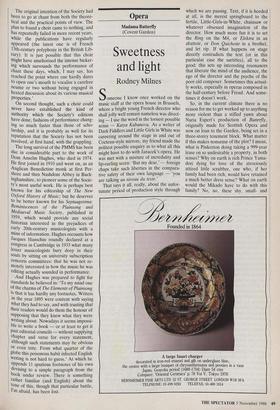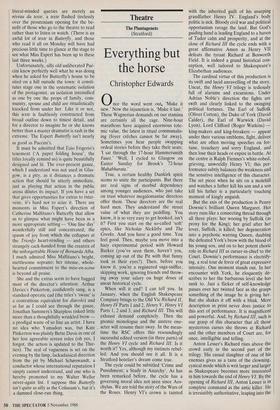Opera
Sweetness and light
Rodney Milnes
Someone I know once worked on the music staff at the opera house in Brussels, where a bright young French director who shall jolly well remain nameless was direct- ing — I use the word in the loosest possible sense — Katya Kabanova. As a welter of Dark Fiddlers and Little Girls in White was careering around the stage in and out of Cocteau-style mirrors, my friend made the politest possible enquiry as to what all this might have to do with Janacek's opera. He was met with a mixture of incredulity and lip-curling scorn: 'But my dear,' — foreign chaps take such liberties in the compara- tive safety of their own language — 'you are talking au niveau du texte.'
That says it all, really, about the unfor- tunate period of production style through which we are passing. Text, if it is heeded at all, is the merest springboard to the fertile, Little-Girls-in-White, chainsaw or whatever obsessed imagination of the director. How much more fun it is to set the Ring on the M4, or Elektra in an abattoir, or Don Quichotte in a brothel, and let rip. If what happens on stage directly contradicts the text (or in this particular case the surtitles), all to the good: this sets up interesting resonances that liberate the mind of the audience, the ego of the director and the psyche of the poor old composer. Sometimes this actual- ly works, especially in operas composed in the half-century before Freud. And some- times it doesn't work.
So, in the current climate there is no reason for me to get worked up to anything more violent than a stifled yawn about Nuria Espert's production of Butterfly, originally made for Scottish Opera and now on loan to the Garden, being set in a three-storey tenement block. What matter if this makes nonsense of the plot? I mean, what is Pinkerton doing taking a 999-year lease on so undesirable a property, in both senses? Why on earth is rich Prince Yama- dori dying for love of the atrociously attired little scrubber, one who, if her family had been rich, would have retained a much better dress sense? What on earth would the Mikado have to do with this family? No, no, these shy, small- and
literal-minded queries are merely au niveau du texte, a texte flashed tirelessly over the proscenium opening for the be- nefit of those who go to the theatre to read rather than to listen or watch. (There is an awful lot of texte in Butterfly, and those who read it all on Monday will have had precious little time to glance at the stage to see what Miss Espert has been up to these last three weeks.) Unfortunately, silly old unliberated Puc- cini knew perfectly well what he was doing when he asked for Butterfly's house to be sited on a hill outside the town: it consti- tutes stage one in the systematic isolation of the protagonist, an isolation intensified as one by one the props of family, com- munity, spouse and child are ritualistically knocked from under her. Like it or not, this texte is faultlessly constructed from broad outline down to tiniest detail, and for a director to imagine he or she knows better than a master dramatist is rash in the extreme. The Espert Butterfly isn't nearly as good as Puccini's.
It must be admitted that Ezio Frigerio's tenement CA paper folding house', the titles loyally remind us) is quite beautifully designed and lit. The ever-present gauze, which I understand was not used in Glas- gow, is a pity, as it distances a dramatic action that should be utterly immediate, just as playing that action in the public arena dilutes its impact. If you have a set that gives opportunities for extras to inter- vene, it's hard not to seize it. There are moments in Miss Espert's direction of Catherine Malfitano's Butterfly that allow us to glimpse what might have been in a more appropriate setting — 'One fine day' wonderfully still and concentrated, the spasm of joy from which she collapses at the Trionfo heart-rending — and others strangely cack-handed from the creatrix of the unforgettable House of Bernarda Alba. I much admired Miss Malfitano's bright, mettlesome soprano; her intense, whole- hearted commitment to the mise-en-scene is beyond all praise.
She and the extras seem to have bagged most of the director's attention: Arthur Davies's Pinkerton, confidently sung, is a standard operatic cad (the titler's 'swine' is a contentious equivalent for diavolo) and as far as I could see through the gauze, Jonathan Summers's Sharpless risked little more than a thoughtfully wrinkled brow a prodigal waste of so fine an artist. I have no idea who Yamadori was, but Kate Pinkerton was plainly Bette Davis in one of her less agreeable screen roles (oh yes, I forgot, the action is updated to the Thir- ties). The seal of vagueness is set on the evening by the limp, lackadaisical direction from the pit by Michael Schonwaridt, a conductor whose international reputation I simply cannot understand, and one who is hereby promoted to my Walter Weller never-again list. I suppose this Butterfly isn't quite as silly as the Coliseum's, but it's a damned close-run thing.



































































 Previous page
Previous page